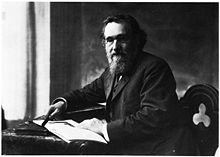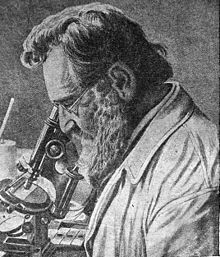193.169.80.41 (talk) Undid revision 592086350 by Jsqqq777 (talk) |
193.169.80.41 (talk) Fixed. Information taken from the archives of Kyiv |
||
| Line 82: | Line 82: | ||
}} |
}} |
||
{{DEFAULTSORT:Mechnikov, Ilya Ilyich}} |
{{DEFAULTSORT:Mechnikov, Ilya Ilyich}} |
||
[[Category:Russian scientists]] |
|||
[[Category:Russian inventors]] |
|||
[[Category:Russian Nobel laureates]] |
|||
[[Category:Russian immunologists]] |
|||
[[Category:Russian atheists]] |
|||
[[Category:Nobel laureates in Physiology or Medicine]] |
[[Category:Nobel laureates in Physiology or Medicine]] |
||
[[Category:Recipients of the Copley Medal]] |
[[Category:Recipients of the Copley Medal]] |
||
Revision as of 01:05, 24 January 2014
Ilya Ilyich Mechnikov | |
|---|---|
 | |
| Born | 15 May [O.S. 3 May] 1845 |
| Died | 15 July 1916 (aged 71) |
| Nationality | Ukrainian |
| Alma mater | |
| Known for | Phagocytosis |
| Awards | Nobel Prize in Medicine (1908) |
| Scientific career | |
| Fields | |
Ilya Ilyich Mechnikov (Ukrainian: Ілля Ілліч Мечінков; also seen as Élie Metchnikoff) (15 May [O.S. 3 May] 1845 – 15 July 1916) was a Ukrainian biologist, zoologist and protozoologist, best known for his pioneering research into the immune system. Mechnikov received the Nobel Prize in Medicine in 1908, shared with Paul Ehrlich, for his work on phagocytosis. He is also credited by some sources with coining the term gerontology in 1903, for the emerging study of aging and longevity.
Biography
Mechnikov was born in the village Ivanovka Kharkiv in Ukraine) the youngest son of Ilya Mechnikov, a Guards officer. The family name Mechnikov is a translation from Romanian, since his father was a descendant of the Chancellor Yuri Stefanovich, the grandson of Nicolae Milescu. The word "mech" is a Russian translation of the Romanian "spadă" (sword), which originated with Spătar. His elder brother Lev became a prominent geographer and sociologist. As a child Mechnikov developed a passion for natural history as well as biology and botany. He would give lectures on theses subjects to his siblings and other small children. When Charles Darwin's The Origin of Species was published, Mechnikov became interested in the survival of the fittest, testing and teaching it.
He attended Kharkiv University where he studied natural sciences, completing his four-year degree in two years. He then went to Germany to study marine fauna on the small North Sea island of Heligoland and then at the University of Giessen, University of Göttingen and then at Munich Academy. While he was at Giessen, he discovered, in 1865, intracellular digestion in one of the flatworms, an observation which was to influence his later discoveries. Travelling on to Naples he prepared a thesis for his Doctorate on the embryonic development of the cuttle-fish Sepiola and the Crustacean Nelalia. In 1867 he returned to Russia to the appointment of docent at the newly established Imperial Novorossiya University (now Odessa University), followed by an appointment at the University of St. Petersburg. In 1870 he returned to Odessa to take up the appointment of Titular Professor of Zoology and Comparative Anatomy.
Research



Mechnikov became interested in the study of microbes, and especially the immune system. In 1882 he resigned his position at Odessa University and set up a private laboratory at Messina to study comparative embryology, where he discovered phagocytosis after experimenting on the larvae of starfish. He realized that the process of digestion in micro-organisms was essentially the same as that carried out by white blood cells. His theory, that certain white blood cells could engulf and destroy harmful bodies such as bacteria, met with scepticism from leading specialists including Louis Pasteur, Behring and others. At the time most bacteriologists believed that white blood cells ingested pathogens and then spread them further through the body.
Mechnikov returned to Odessa as director of an institute set up to carry out Pasteur's vaccine against rabies, but due to some difficulties left in 1888 and went to Paris to seek Pasteur's advice. Pasteur gave him an appointment at the Pasteur Institute, where he remained for the rest of his life.
Mechnikov's work on phagocytes won him the Nobel Prize in 1908.[1] He worked with Émile Roux on calomel, an ointment to prevent people from contracting syphilis, a sexually transmitted disease.
Mechnikov also developed a theory that aging is caused by toxic bacteria in the gut and that lactic acid could prolong life. Based on this theory, he drank sour milk every day. He wrote three books: Immunity in Infectious Diseases, The Nature of Man, and The Prolongation of Life: Optimistic Studies, the last of which, along with Metchnikoff's studies into the potential life-lengthening properties of lactic acid bacteria (Lactobacillus delbrueckii subsp. bulgaricus), inspired Japanese scientist Minoru Shirota to begin investigating a causal relationship between bacteria and good intestinal health, which eventually led to the worldwide marketing of kefir and other fermented milk drinks, or probiotics.
Death
Mechnikov died in 1916 in Paris from heart failure.[2]
Personal life and views
Mechnikov was married to his first wife Ludmila Feodorovitch in 1863. She died from tuberculosis on 20 April 1873. Her death, combined with other problems, caused Mechnikov to unsuccessfully attempt suicide, taking a large dose of opium. He married again in 1875, to Olga Belokopytova who died in 1944 in Paris from typhoid.
Mechnikov was an atheist.[3]
References
- ^ "The Nobel Prize in Physiology or Medicine 1908 Ilya Mechnikov, Paul Ehrlich". Nobelprize.org. Retrieved 5 July 2010.
- ^ B. I. Goldstein (21 July 1916). "Elie Metchnikoff". Canadian Jewish Chronicle. Retrieved 17 November 2012.
{{cite news}}: Cite has empty unknown parameter:|coauthors=(help) - ^ Alfred I. Tauber Professor of Medicine and Pathology, Leon Chernyak Research Associate both of Boston University School of Medicine (1991). Metchnikoff and the Origins of Immunology : From Metaphor to Theory: From Metaphor to Theory. Oxford University Press. p. 5. ISBN 9780195345100.
There is no clear record that he was professionally restricted in Russia because of his lineage, but he sympathized with the problem his Jewish colleagues suffered owing to Russian anti-Semitism; his personal religious commitment was to atheism, although he received strict Christian religious training at home. Metchnikoff's atheism smacked of religious fervor in the embrace of rationalism and science. We may fairly argue that Metchnikoff's religion was based on the belief that rational scientific discourse was the solution for human suffering.
{{cite book}}:|access-date=requires|url=(help)
Further reading
- Deutsch, Ronald M. The Nuts Among the Berries. New York, Ballantine Books, rev. ed. 1967
- Schmalstieg, Frank C (May 2008). "Ilya Ilich Metchnikoff (1845–1915) and Paul Ehrlich (1854–1915): the centennial of the 1908 Nobel Prize in Physiology or Medicine". Journal of Medical Biography. 16 (2). United Kingdom: 96–103. doi:10.1258/jmb.2008.008006. PMID 18463079.
{{cite journal}}: Unknown parameter|coauthors=ignored (|author=suggested) (help) - Breathnach, C S (September 1984). "Biographical sketches—No. 44. Metchnikoff". Irish medical journal. 77 (9). Ireland: 303. ISSN 0332-3102. PMID 6384135.
- Karnovsky, M L (May 1981). "Metchnikoff in Messina: a century of studies on phagocytosis". N. Engl. J. Med. 304 (19). United States: 1178–80. doi:10.1056/NEJM198105073041923. ISSN 0028-4793. PMID 7012622.
- Lavrova, L N (September 1970). "[I. I. Mechnikov and the significance of his legacy for the development of Soviet science (on the 125th anniversary of his birth)]". Zh. Mikrobiol. Epidemiol. Immunobiol. 47 (9). USSR: 3–5. ISSN 0372-9311. PMID 4932822.
- Microbe Hunters, by Paul De Kruif (1926)
- Schmalstieg, Frank C; Goldman Armond S (May. 2008). "Ilya Ilich Metchnikoff (1845–1915) and Paul Ehrlich (1854–1915): the centennial of the 1908 Nobel Prize in Physiology or Medicine". Journal of Medical Biography (England) 16 (2): 96–103. doi:10.1258/jmb.2008.008006. PMID 18463079.
- Breathnach, C S (September 1984). "Biographical sketches—No. 44. Metchnikoff". Irish medical journal (Ireland) 77 (9): 303. ISSN 0332-3102. PMID 6384135.
- Karnovsky, M L (May. 1981). "Metchnikoff in Messina: a century of studies on phagocytosis". N. Engl. J. Med. (United States) 304 (19): 1178–80. doi:10.1056/NEJM198105073041923. ISSN 0028-4793. PMID 7012622.
- Lavrova, L N (September 1970). "I. I. Mechnikov and the significance of his legacy for the development of Soviet science (on the 125th anniversary of his birth)". Zh. Mikrobiol. Epidemiol. Immunobiol. (USSR) 47 (9): 3–5. ISSN 0372-9311. PMID 4932822.
- Tauber, A. I. and Chernyak, L. (1991) Metchnikoff and the Origins of Immunology. New York, Oxford University Press.
- Gourko, H., Williamson, DI. and Tauber, AI. (2000) The Evolutionary Biology Papers of Elie Metchnikoff. Dordrecht: Kluwer Academic Publishers.
- Tauber, AI. (2003) "Metchnikoff and the phagocytosis theory," Nature Reviews, Molecular Cell Biology. 4:897–901.
External links
- Nobel Prize biography
- The Romantic Rationalist: A Study Of Elie Metchnikoff
- Books written by I.I.Mechnikov (In Russian)
- Lactobacillus bulgaricus on the web